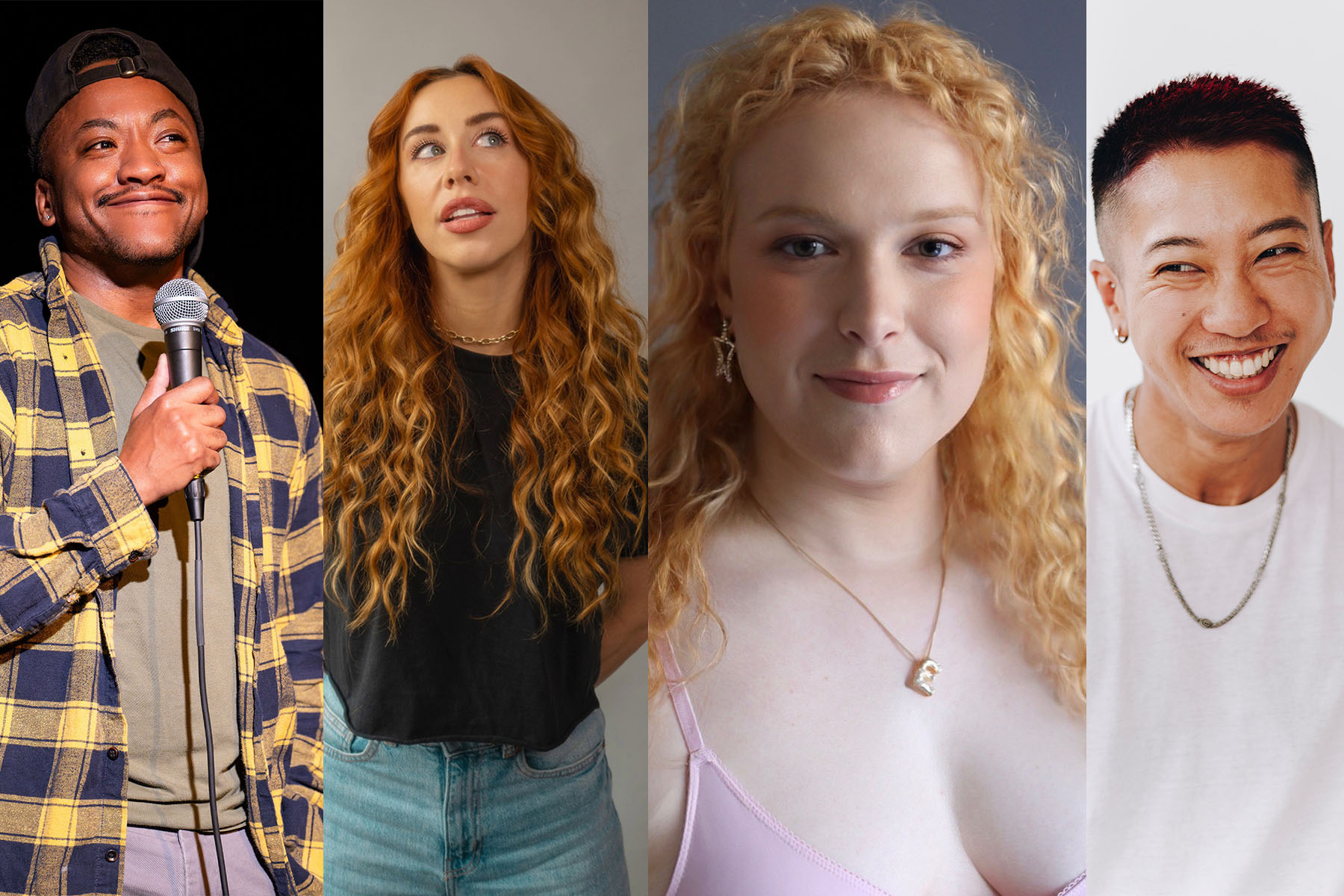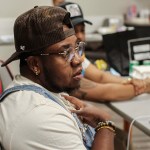Esther Fallick wants her comedy to be an escape from the horrors. But that escape has a purpose: to make it easier to face these times for what they are. By poking fun at something that can feel so heavy, like the president pitting his administration against transgender people, Fallick wants to find ways to bring people together and laugh off the darkness creeping in on everyday life.
“We could be having a little more fun as a community, as a country. I just feel like so much of what we’re talking about as trans people right now is so dire. There’s reason for that, but I just wanted a space to be intentionally silly,” she said. Intentions aside, she still spent the first episode of her podcast — aptly titled, “Having Fun” — joking about fleeing anti-trans violence in America with fellow comedian Ella Yurman. The gallows humor is inescapable.
Her weekly variety show in Brooklyn, titled “While We’re Here,” is also a dark joke: We’re only here, alive and on this planet, for so long. And life is only getting harder. So what should we do in the meantime? Fallick suggests laughter, to start, followed by music, reading and teach-ins on topics ranging from transmisogyny — how trans women are hurt by both misogyny and transphobia — to demilitarizing New York City’s police force, especially in Brooklyn.
“It’s a very balanced breakfast,” she said — one that’s meant to nourish a community in the crosshairs of powerful political forces.
Fallick is one of many trans and queer comedians whose stars are rising at a time when LGBTQ+ rights are in peril across the United States. Trans people are being personally singled out by the Trump administration and depicted in a negative light, or even as anti-American, as part of a broader effort to deny them legal rights. LGBTQ+ teachers, parents and out trans people are frequent targets of right-wing harassment campaigns. After years of rising political attacks, the future of LGBTQ+ rights in America is so uncertain that more people are considering leaving the country, or have already left.
Fallick, a trans woman, knows the future is bleak. It feels like the government wants to make trans people afraid to leave the house, she said. Through policy, trans people are essentially being told to hide or shy away from the public eye.
“I’m dissociating just talking to you, because it’s so bleak. But it’s happening, and trans people are going to die, and they don’t care,” she said. “Humor helps us look at it. It’s a bit of a Novocaine, so we can continue to stare it in the face. We don’t have to look away if we can laugh at it.”
In the last year, Fallick’s approach to comedy has fundamentally changed. Her comedy used to be a plea for understanding. She wanted to build bridges with cisgender women to show them how their womanhood is not so different. She still believes in that idea, but it’s not what she cares about right now. Now, her jokes are angrier — and she has a greater purpose.
-
Read Next:
“I’m not worried about any cis feelings at all,” she said. “Their attitudes, their feelings, I just don’t really care. Right now I care about trans people, fortifying them emotionally.”
The 19th first spoke with Fallick and three other LGBTQ+ comedians in the summer before President Donald Trump was re-elected. One year later, with Trump now in office, we came back to talk with them again. They shared how they make people laugh when their audiences are both paralyzed and overwhelmed by the state of the world, what it’s like to get on stage when their identity is so politicized, and what it means to be an LGBTQ+ comic during the second Trump administration.
The short answer: It’s a lot of work to make the world seem funny right now, and it can come at a personal cost.
“I wonder if I’m putting a target on my back, by speaking up about certain things,” said Britt Migs, a queer comedian based in New York. As a bisexual woman dating a transgender man, she occasionally writes jokes about the more mystifying or fragile aspects of masculinity. For example, why do some men stuff their jean pockets to the brim instead of just carrying a bag? Why did men go feral in her DMs immediately after she got divorced? And is straight marriage as challenging as Crossfit?
Frequently, cisgender men respond to her jokes with anger. She’s been heckled on stage and online, and she’s used to receiving the same hateful or belligerent comments that all women comics seem to face. Throughout her career, she’s realized that many men simply do not believe that women are smart enough to be comedians — and she wonders what else that belief extends to.
With Trump back in office, thanks in part to young male voters, she’s become more pessimistic about the kind of misogyny that she sees up-close through her comedy.
“It’s crazy that so many Gen Z men are being radicalized. They do not see women as human or they see us as the reason that their lives are not the way that they want it to be. They glorify the ‘tradwife’ thing,” she said. “It’s just setting us back.”
Men are the gatekeepers of her industry, Migs said. Great comics with potential have been ostracized or bullied out of the field because of men with power, she said, including disgraced kings of comedy like Louis C.K., who confirmed in 2017 that the multiple sexual misconduct allegations against him were true. The women who accused him feared career repercussions for speaking out, according to the New York Times.
The sitting president has a long history of sexual misconduct and has been found liable in civil court for sexual abuse, defamation and fraud. None of the criminal charges, indictments or evidence brought against Trump have barred him from office. At this point, Trump’s many scandals as a candidate and politician have been fodder for late night talk shows, radio and podcast hosts, and comedians for nearly a decade. But public ridicule has not forced change — which, for some comics, calls into question whether comedy can truly be used as a tool to afflict the comfortable and comfort the afflicted.
“I do think that Trump broke comedy a little bit. I don’t think that pointing out hypocrisy — they know that they’re hypocritical,” Fallick said. “They don’t care.”
Last September, late-night host Jimmy Kimmel recapped “all the crazy stuff Donald Trump did over the summer,” including selling sneakers themed around his first assassination attempt. John Oliver recently reminded “Last Week Tonight” viewers of when the president appeared to yell at a child mowing the White House lawn, when he asked a 7-year-old girl if she believes in Santa Claus, and more recently, when he used dolls as a metaphor to discuss tariffs.
“All of culture and all of comedy pointed everything that it had at Trump, but it didn’t do anything. He still got in,” Fallick said. “It removed any illusion that, like, ‘The Daily Show’ will save us.”
Meanwhile, on the 2024 campaign trail, Trump sat down to interviews with plenty of conservative male comedians, streamers and podcasters that may have helped him win re-election. To Kai Choyce, a trans comedian based in Los Angeles, right-wing comedians played a key role to getting Trump re-elected — not with their comedy, but by using their enormous platforms to endorse and normalize him.
“Comedy is not changing any legislation, but rich comedians with access to politicians might,” he said.
With their community under attack by a politician who is apparently immune to a lifetime of scandals and perhaps beyond parody, LGBTQ+ comics are reimagining how their comedy can be a tool for change — or a balm for those who need relief.
“I don’t know if this is naive of me, but I almost feel like it’s really important now to get connected to straight people who really don’t know anything about us, and maybe only have misconceptions from the news of what other people are saying about us,” said James Tom, one of the most prominent trans comedians in the country.
Tom has spent some time in the spotlight as an LGBTQ+ comic, including his appearance last year in a Netflix special with international star Hannah Gadsby. His comedy has evolved alongside the political atmosphere of the country. In 2016, when Trump first took office, he focused on reaching queer people and people of color in his audience. They deserved a laugh more than anyone, he reasoned. He wanted to raise their morale. Now, to make change, he wants to reconnect with straight people.
In a way, broadening his audience goes back to Tom’s comedic roots. He started his career in straight clubs, cutting through the tension of explaining they/them pronouns to an unaware 2013 crowd. Now, amid what he describes as a grand surplus of trans and queer comics, he doesn’t feel the same kind of responsibility to be a lone comedic representative for LGBTQ+ people or the need to tailor his comedy for them.
“I want to try to get in front of straight people again and be like, ‘Hey, I’m a person just like you. I have a story, and we can all laugh about it together,’” Tom said. Maybe, he hopes, he can actually influence people that way — without censoring himself or watering down his identity.
“Right now, things are so volatile for us. They’re almost so transphobic that I don’t feel pressured to be a good role model or a good example anymore, because we’re past that. They already think the worst things about us. They’re already legislating against us,” he said. “So I think it’s time for me to just be honest and real.”
-
Read Next:
Tom wants to relearn what tensions exist between straight people and LGBTQ+ people, and how he can cut through them with humor. His early days back in 2013 seem like a simpler time. In 2025, some in his audience may harbor actual hostility towards him for his gender identity. But they’ll be met with Tom’s confidence in who he is and how he wants to be seen, in both his gender and the stories he wants to tell.
For Choyce, creating levity in the face of adversity and oppression is important. But getting on stage comes with a certain amount of vulnerability — which he doesn’t want to share with those who are hostile to his identity.
“My jokes about the most difficult and special parts of my life aren’t told with the goal of convincing people who hate me to recognize my humanity. They’re to entertain the people who are at the table and open to learn something new and have a good time,” he said. “If we have to do that in a queer comedy speakeasy, so be it.”
Where queer comedy takes place, and how it’s told, has always been fluid. Last year, a Netflix documentary on the history of LGBTQ+ comedy explored how queer comics have managed bigotry while growing their careers and finding their voices. Many older comedians were in the closet out of necessity — or were told to stay there. But despite rampant homophobia in the industry, humor became an important part of the LGBTQ+ rights movement by shaping public opinion.
Guy Branum, one of the comedians featured, put it this way in the documentary: “Queer people taught America to stop being afraid of us by making jokes.”
To many comedians, LGBTQ+ people are uniquely positioned to use the disarming nature of laughter to change how others see those who appear different from them. So many queer people grow up navigating uncomfortable or traumatic situations that cutting through tension with a well-timed joke is second nature to them — and that joke may just give someone a new perspective, teach them something new, or make them second-guess their own prejudice. Or, it may not.
Regardless, LGBTQ+ comedians will keep finding humor in politicians’ attempts to scare them into being quiet — like when Fallick recently celebrated getting “the last vaginoplasty in America.” Humor dilutes the fear. Jokes help fight the urge to look away or live in denial of what’s happening.
Feeling overwhelmed by the news? The 19th is considering new ways to keep you informed. But we need your input! Fill out this quick survey to share your thoughts.








